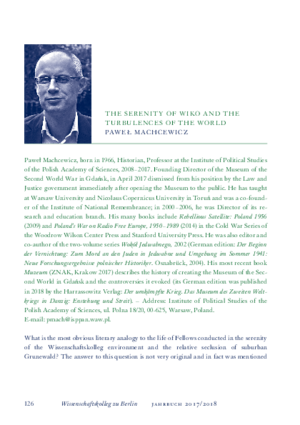
Pawel Machcewicz, Dr.
Professor of History
Polnische Akademie der Wissenschaften, Warschau
Born in 1966 in Warsaw
Studied History at the University of Warsaw
Arbeitsvorhaben
Retributive Justice after World War II and the Fall of Dictatorial Regimes in Europe, Latin America, and South Africa: a Comparative Approach
The goal of the project is to create a comparative approach to various ways in which European, Latin American, and the Republic of South Africa's states and societies came to terms with legacies of crimes committed during WW II and the reign of dictatorial regimes in the second half of the 20th century.The project will address one of the central issues that states and nations confront in transitional periods after the end of wars or the collapse of dictatorships. This problem usually becomes fundamental in the initial phases of post-war or post-authoritarian reconstruction. However, in some countries it gains political and social importance in delayed ways, a long time after the conclusion of war or occupation (e.g. France and the legacy of the Vichy regime) or after the collapse of dictatorial regimes (Spain and the legacy of the Franco regime and of the Civil War of 1936-39; Poland with the most intense public interest and institutional arrangements starting approximately ten years after the collapse of Communism). One of the most important questions that should be addressed in the project is the impact of legal and political retribution (or its absence) on the consolidation of new, emerging regimes. A widespread intellectual approach suggests that retribution (e.g. spontaneous or legal, institutional purges) is detrimental and dysfunctional for the consolidation of democratic regimes that replace dictatorships or for the prospects of social integration and peace of societies torn by wartime conflicts. On the other hand, there are examples in which the absence of retribution leads to widespread feelings of frustration and anger, which can give birth to radical movements that become serious challenges to democratic systems.
Another pivotal issue that the project will address is a wide variety of legal (or extra-legal) and institutional mechanisms of coming to terms with the legacies of political crimes and the difficult wartime or dictatorial past. In some instances, these were post-war purges (spontaneous or institutional), like in France or Italy after WW II. In other countries (Latin America, South Africa), the truth commissions sought to reveal crimes committed by past dictatorial regimes. In Poland and some other post-Communist countries, special institutions were created (e.g. the Polish Institute of National Remembrance) that attempt to provide a complex approach to the past: opening the archives and so-called lustration, research and education, and the legal prosecution of political crimes. A vital aim of the project will be a comparison of the merits and defects of the specific ways of coming to terms with the past chosen in various countries.
Recommended Reading
Machcewicz, Pawel, Edmund Dmitrów and Tomasz Szarota. Der Beginn der Vernichtung: zum Mord an den Juden in Jedwabne und Umgebung im Sommer 1941; neue Forschungsergebnisse polnischer Historiker. Osnabrück: fibre, 2004.
Machcewicz, Pawel. Rebellious Satellite: Poland 1956. Stanford: Stanford University Press. Washington, DC: Woodrow Wilson Center, 2009.
-. Poland's War on Radio Free Europe, 1950-1989. Stanford: Stanford University Press. Washington, DC: Woodrow Wilson Center, 2014.
Kolloquium, 19.06.2018
Retributive Justiz nach dem Zweiten Weltkrieg: Die Kreuzungen von Politik, Recht und Geschichte
Was ist retributive Justiz? Die kürzeste Antwort wäre: Eine Abrechnung mit dem Erbe von Verbrechen und Verfehlungen, das gestürzte Regime und deren Täter hinterlassen haben. Aus vielen Gründen, die ich in meinem Vortrag erklären werde, verwende ich nicht den Begriff "Übergangsjustiz" (transitional justice), der in den letzten drei Jahrzehnten sehr beliebt war. Allerdings ist er in seiner Bedeutung sehr viel breiter und könnte in vielen Hinsichten irreführend sein. Ich konzentriere mich auf das Strafrecht, das für mich den Kern der retributiven Justiz ausmacht: Strafprozesse gegen die Führer gefallener Regime und gegen die Täter politisch oder ideologisch motivierter Verbrechen.
Die meisten Untersuchungen zur Übergangsjustiz heben ihre positive Wirkung auf die Errichtung neuer demokratischer Systeme nach dem Zusammenbruch von Diktaturen oder nach dem Ende von Kriegen hervor - indem eine elementare moralische Ordnung wiederhergestellt wird, das öffentliche Vertrauen in die neuen demokratischen Institutionen gestärkt und auch eine Warnung an jene ausgesprochen wird, die in der Zukunft möglicherweise planen, die Demokratie erneut zu beschädigen und Menschenrechte zu verletzen. Im Zeitraum der letzten zwanzig Jahre wurde dieses positive (oder sogar idealistische) Bild der Übergangsjustiz zur vorherrschenden, üblichen Betrachtungsweise in den Politik- und Sozialwissenschaften. Ich möchte diese etablierte Sichtweise infrage stellen oder zumindest einige Differenzierungen einführen - auch indem ich die Fehlschläge der retributiven Justiz analysiere, ihre Instrumentalisierung zu politischen Zwecken, ihre vielfältigen Verzerrungen. Wenn wir viele Fälle der retributiven Justiz genauer analysieren - auch jene, die weithin als sehr erfolgreich und nützlich gelten -, so erweist sich die Wirklichkeit für gewöhnlich als sehr viel komplexer. Man kann häufig Fragen aufwerfen: Wenn die retributive Justiz junge Demokratien tatsächlich schwächt, dann erweist sie sich als dysfunktional oder sogar als Verstoß gegen ein elementares Empfinden dessen, wofür die Justiz stehen und wie sie implementiert werden sollte.
Im Zentrum meines Interesses stehen die Überschneidungen von Politik, Justiz und die Einschätzungen vergangener Verbrechen im Wandel der Geschichte. Ich versuche zu analysieren, wie diese drei Dimensionen einander in verschiedenen historischen Entwicklungen nach dem Zweiten Weltkrieg beeinflusst - und oft auch verzerrt - haben.
Publikationen aus der Fellowbibliothek
Machcewicz, Pawel (Kraków, 2021)
Wina, kara, polityka : rozliczenia ze zbrodniami II wojny światowej
Machcewicz, Pawel (Wiesbaden, 2018)
Der umkämpfte Krieg : das Museum des Zweiten Weltkriegs in Danzig : Entstehung und Streit Muzeum
Machcewicz, Pawel (2016)
Representing violence and death in the Museum of the Second World War in Gdańsk
Machcewicz, Pawel (Gdańsk, 2016)
Museum of the Second World War : catalogue of the permanent exhibition
Machcewicz, Pawel (Paris, 2015)
Machcewicz, Pawel (2015)
Droga do Norymbergi : geneza sądowych rozliczeń ze zbrodniami III Rzeszy
Machcewicz, Pawel (Washington, D.C., 2014)
Poland's war on Radio Free Europe : 1950 - 1989 Monachijska menażeria
Machcewicz, Pawel (2012)
The Institute of National Remembrance and the legacy of communism in Poland
